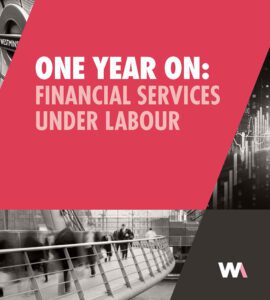
One year on: financial services under Labour
The success of this Labour Government rests on its ability to drive economic growth, not just as a headline figure, but also demonstrably improving household finances at a time of increased cost of living pressures.
Prime Minister Keir Starmer and Chancellor Rachel Reeves are all too aware of this fact and have been clear that the financial and professional services sector is central to delivering against both their economic mission and their political plans for the sector.
Reeves reiterated this message at her Mansion House speech in July 2025, when she stated – “I have placed financial services at the heart of this government’s growth mission…” and identified financial services as one of eight high-growth sectors in the industrial strategy.
Reeves’ Treasury team have matched words with action, and, within industry, there is a view that there has not been such an open dialogue around regulatory reform since before the 2008 financial crisis.
There are ongoing regulatory reforms, reviews, consultations and dialogue across the whole of the industry, including market changing reforms in private and local government pensions, reforms to the banking ring-fence regime, a consultation to streamline the Senior Managers & Certification Regime (SM&CR), a consultation on captive insurance models, divergence from the EU on the Green Taxonomy and sustainability disclosure regime, open finance, and a commitment to reduce the complexity, regulation and impact of the Financial Ombudsmen Service (FOS) – to name but a few.
However, the Government is going to expect pay back from the industry for the political capital it is using to unlock growth through financial services reform. One which is essential to the sector, but not an obvious vote winner ahead of the next election.
As 2029 nears, government will want to see more investment directed into The UK, businesses receiving the investment they need to grow and hire people, and consumers to have more choice and access to financial services.
A perception that industry has not held up its side of the bargain could lead to a more interventionist approach by Government; a point demonstrated by the mandation powers written in to the Pensions Schemes Bill currently passing through Parliament.
As 2025 draws to a close and in the wake of another fundamental reshuffle of the Government decks, the key question is what the relationship between Government and industry will look like in the future.
With the conjecture already mounting about tax rises in the Budget and pressure to reassure voters that Labour is stable and capable of delivery, the Government finds itself in a very difficult place and the Chancellor will need to make ‘tough’ choices. A move which could impact industry if the “broadest shoulders” are asked to carry the heaviest load.
In this report, the WA Financial and Professional Services team have analysed the policy and media agenda, what the 2025 Mansion House speech means for industry, and picked out some of the most influential ministers, parliamentarians and advisers shaping the agenda. We hope you find it useful and it sparks some reflections.
One year on: financial services under Labour
To discuss the financial services policy landscape, the government’s priorities, and what’s driving media coverage of the sector, please contact Tom Frackowiak at tomfrackowiak@wacomms.co.uk.
